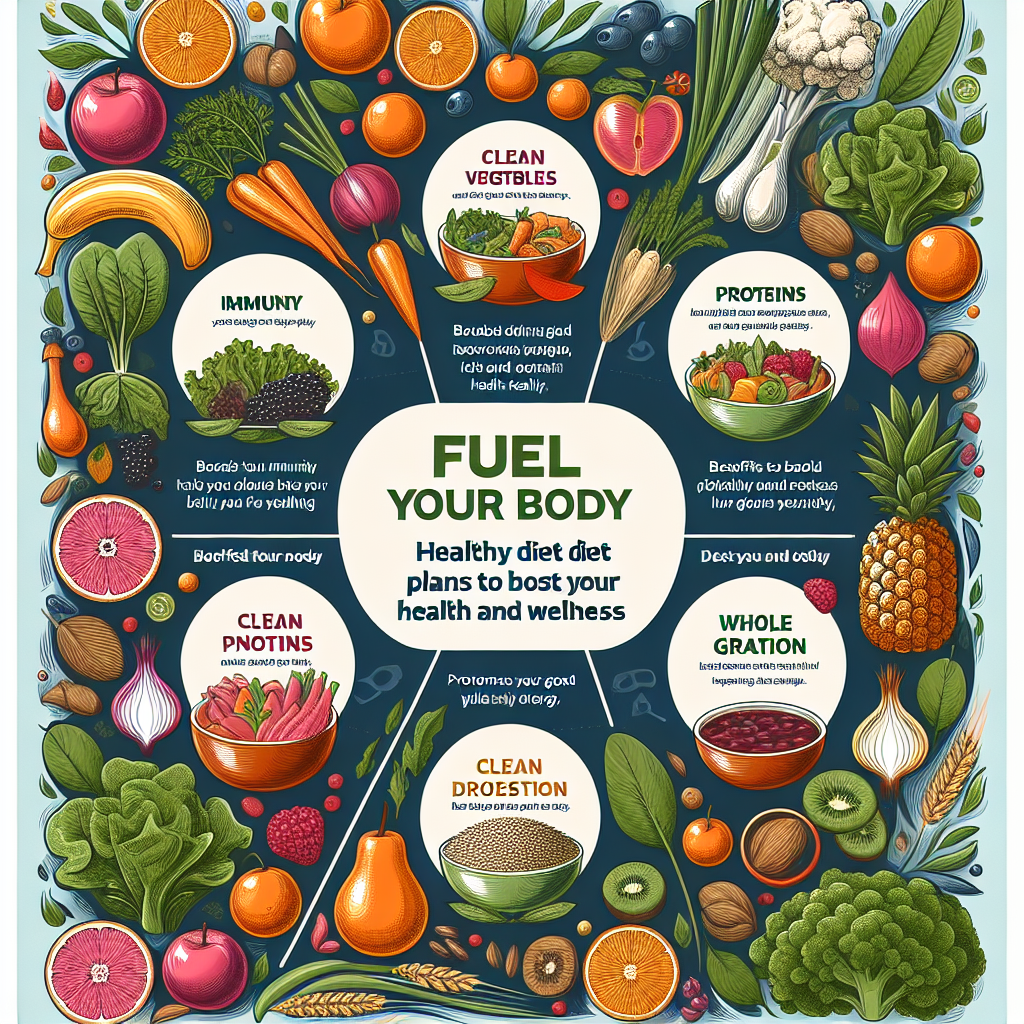Fuel Your Body: 5 Healthy Diet Plans to Boost Your Health and Wellness

Maintaining a healthy diet is crucial for overall health and wellness. A balanced diet provides the necessary nutrients, vitamins, and minerals that our bodies need to function properly. It can also help prevent chronic diseases, boost our immune system, and improve our mental health. With so many diet plans available, it can be overwhelming to choose the right one. However, understanding the different types of diet plans and their benefits can help you make an informed decision about what works best for you.
Key Takeaways
- A healthy diet plan is essential for optimal health and wellness.
- A balanced diet benefits both the body and mind.
- The Mediterranean diet is a delicious and nutritious option.
- The DASH diet can lower blood pressure and improve overall health.
- The Flexitarian diet offers a flexible and sustainable approach to eating.
The Benefits of a Balanced Diet for Your Body and Mind
A balanced diet has numerous benefits for both our physical and mental health. When we eat a variety of foods from different food groups, we ensure that our bodies receive all the essential nutrients they need. This can improve our energy levels, support healthy weight management, and reduce the risk of chronic diseases such as heart disease, diabetes, and certain types of cancer.
In addition to physical health benefits, a healthy diet also has a positive impact on our mental well-being. Research has shown that certain nutrients, such as omega-3 fatty acids found in fish and nuts, can help reduce symptoms of depression and anxiety. A balanced diet can also improve cognitive function and memory, allowing us to think more clearly and focus better.
The Mediterranean Diet: A Delicious and Nutritious Plan
The Mediterranean diet is a popular and well-researched diet plan that is based on the traditional eating habits of people in countries like Greece and Italy. It emphasizes whole foods such as fruits, vegetables, whole grains, legumes, nuts, seeds, olive oil, and lean proteins like fish and poultry. Red meat is consumed in moderation, while processed foods and added sugars are limited.
The Mediterranean diet has been associated with numerous health benefits. Studies have shown that it can reduce the risk of heart disease, lower blood pressure, improve cholesterol levels, and promote weight loss. It is also rich in antioxidants and anti-inflammatory compounds, which can help protect against chronic diseases and promote longevity.
The DASH Diet: Lower Your Blood Pressure and Improve Your Health
| Metrics | Values |
|---|---|
| Number of servings of fruits and vegetables per day | 4-5 |
| Sodium intake per day | Less than 2,300 mg |
| Number of servings of whole grains per day | 6-8 |
| Number of servings of lean protein per day | 6 or less |
| Number of servings of dairy per day | 2-3 |
| Number of servings of nuts, seeds, and legumes per week | 4-5 |
| Number of servings of sweets and added sugars per week | Less than 5 |
| Number of servings of fats and oils per day | 2-3 |
The DASH (Dietary Approaches to Stop Hypertension) diet is specifically designed to lower blood pressure and improve heart health. It focuses on consuming foods that are low in sodium, saturated fats, and cholesterol, while being high in fruits, vegetables, whole grains, lean proteins, and low-fat dairy products.
Research has consistently shown that the DASH diet can effectively lower blood pressure and reduce the risk of developing hypertension. It can also improve cholesterol levels, reduce the risk of heart disease, and promote weight loss. The DASH diet is not only beneficial for individuals with high blood pressure but can also be followed by anyone looking to improve their overall health.
The Flexitarian Diet: A Flexible and Sustainable Approach to Eating
The flexitarian diet is a flexible approach to eating that focuses on plant-based foods while allowing for occasional consumption of meat and animal products. It encourages individuals to eat more fruits, vegetables, whole grains, legumes, nuts, and seeds while reducing their intake of processed foods and added sugars.
The flexitarian diet offers numerous health benefits. By increasing the consumption of plant-based foods, individuals can benefit from the high fiber content, which aids in digestion and promotes a healthy gut microbiome. It can also help with weight management, reduce the risk of chronic diseases such as heart disease and diabetes, and improve overall longevity.
The Whole30 Diet: A 30-Day Reset for Your Body and Mind

The Whole30 diet is a 30-day elimination diet that aims to reset your body by eliminating certain food groups such as grains, dairy, legumes, added sugars, and processed foods. The diet focuses on consuming whole foods such as fruits, vegetables, lean proteins, and healthy fats.
The Whole30 diet is designed to help identify food sensitivities and promote a healthier relationship with food. It can lead to weight loss, improved digestion, increased energy levels, and reduced inflammation. However, it is important to note that the Whole30 diet is highly restrictive and may not be suitable for everyone. It is recommended to consult with a healthcare professional before starting this diet plan.
The Paleo Diet: Eating Like Our Ancestors for Better Health
The paleo diet is based on the idea of eating like our ancestors during the Paleolithic era. It focuses on consuming whole foods such as lean meats, fish, fruits, vegetables, nuts, and seeds while avoiding processed foods, grains, dairy products, legumes, and added sugars.
The paleo diet has gained popularity due to its potential health benefits. It can lead to weight loss, improved blood sugar control, reduced inflammation, and improved digestion. However, critics argue that the paleo diet may be too restrictive and eliminate important food groups such as grains and legumes that provide essential nutrients. It is important to consider individual needs and preferences when deciding if the paleo diet is right for you.
The Vegan Diet: A Plant-Based Approach to Optimal Health
The vegan diet is a plant-based diet that excludes all animal products including meat, dairy, eggs, and honey. It focuses on consuming fruits, vegetables, whole grains, legumes, nuts, and seeds.
The vegan diet has been associated with numerous health benefits. It can lower the risk of heart disease, reduce cholesterol levels, improve blood sugar control, promote weight loss, and reduce the risk of certain types of cancer. However, it is important for vegans to ensure they are getting all the necessary nutrients such as vitamin B12, iron, calcium, and omega-3 fatty acids through fortified foods or supplements.
Tips for Incorporating Healthy Eating Habits into Your Lifestyle
Incorporating healthy eating habits into your lifestyle can be challenging, but with the right strategies, it can become a sustainable and enjoyable part of your routine. Here are some practical tips to help you make healthy eating a habit:
1. Plan and prepare your meals: Take the time to plan your meals for the week and prepare them in advance. This will help you avoid unhealthy food choices when you’re busy or tired.
2. Include a variety of foods: Aim to include a variety of fruits, vegetables, whole grains, lean proteins, and healthy fats in your diet. This will ensure that you are getting all the necessary nutrients.
3. Listen to your body: Pay attention to your hunger and fullness cues. Eat when you’re hungry and stop when you’re satisfied. Avoid eating out of boredom or emotional reasons.
4. Practice mindful eating: Slow down and savor each bite. Pay attention to the taste, texture, and aroma of your food. This can help you enjoy your meals more and prevent overeating.
5. Stay hydrated: Drink plenty of water throughout the day to stay hydrated. Limit your intake of sugary drinks such as soda and juice.
6. Be flexible: Allow yourself to indulge in your favorite treats occasionally. It’s all about balance and moderation.
Choosing the Best Diet Plan for Your Health and Wellness Goals
When choosing a diet plan, it is important to consider your individual health goals, preferences, and lifestyle. There is no one-size-fits-all approach to healthy eating, and what works for one person may not work for another. It is important to find a diet plan that is sustainable, enjoyable, and meets your nutritional needs.
Remember that a healthy diet is not just about what you eat but also how you eat. Focus on nourishing your body with whole foods, practicing portion control, and listening to your body’s hunger and fullness cues. By making small, sustainable changes to your eating habits, you can improve your overall health and well-being.
If you’re looking for a comprehensive guide to healthy eating, check out this article on HealthyDietDoctor.com. It simplifies the wellness journey by providing practical tips and advice on how to maintain a balanced diet. From immune-boosting foods to medicinal properties of certain foods, this article covers it all. Whether you’re a beginner or an experienced health enthusiast, this article is a must-read. So, click here to learn more about healthy eating simplified: https://healthydietdoctor.com/healthy-eating-simplified-wellness-journey/.
FAQs
What is a healthy diet plan?
A healthy diet plan is a balanced and nutritious eating plan that includes a variety of foods from all food groups in appropriate portions.
What are the benefits of following a healthy diet plan?
Following a healthy diet plan can help maintain a healthy weight, reduce the risk of chronic diseases such as heart disease and diabetes, improve digestion, boost energy levels, and improve overall health and wellbeing.
What foods should be included in a healthy diet plan?
A healthy diet plan should include a variety of fruits, vegetables, whole grains, lean proteins, and healthy fats. It is important to limit processed and high-fat foods, sugary drinks, and alcohol.
How much should I eat when following a healthy diet plan?
The amount of food you should eat depends on your age, gender, weight, and activity level. It is important to follow portion sizes and eat until you are satisfied, not overly full.
Can I still eat my favorite foods while following a healthy diet plan?
Yes, you can still enjoy your favorite foods in moderation while following a healthy diet plan. It is important to balance indulgences with healthy choices and portion control.
Do I need to take supplements while following a healthy diet plan?
If you are eating a balanced and varied diet, you should not need to take supplements. However, some people may need to take supplements if they have specific nutrient deficiencies or medical conditions. It is important to consult with a healthcare professional before taking any supplements.